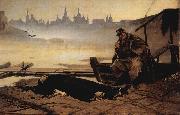Großhandels China Öl Gemälde & Rahmt Ein |
|||||||||||

|
|||||||||||
|
|
|
||||||||||||||
|
Wassilij Grigorjewitsch Perow
Vasily Grigorevich Perov (Russian; real name Vasily Grigorevich Kridener ; 2 January 1834 (21 December 1833 Old Style) - 10 June (29 May Old Style) 1882) was a Russian painter and one of the founding members of Peredvizhniki, a group of Russian realist painters. Vasily Perov was born 2 January 1834 (21 December 1833 Old Style) in Tobolsk, being the illegitimate son of procurator, baron Grigory Karlovich Kridener. After completing a course at Arzamas uezd school, he was transferred to the Alexander Stupin art school also located in Arzamas. In 1853 he was admitted to the Moscow School of Painting, Sculpture and Architecture, where he learned from several renowned artists. In 1856 he was awarded with a minor silver medal for his sketch of a boy's head, presented to the Imperial Academy of Arts. Later the Academy gave him many other awards: in 1857 a major silver medal for Commissary of Rural Police Investigating, a minor golden medal for the Scene on a Grave and the Son of a Dyak Promoted to First Rank, and in 1861 a major golden medal for Sermon in a Village. After receiving the right to a state-paid trip abroad together with a golden medal, in 1862 Perov went to Western Europe, visiting several German cities, and then Paris. During this time he created paintings depicting scenes from European street life, such as the Vendor of statuettes, the Savoyard, the Organ-Grinder in Paris, the Musicians and the Bystanders, and the Paris Ragpickers. Returning to Moscow early, from 1865 to 1871 Perov created his masterpieces The Queue at The Fountain, A Meal in the Monastery, Last Journey, Troika, the Lent Monday, Arrival of a New Governess in a Merchant House, the Drawing Teacher, A Scene at the Railroad, the Last Tavern at Town Gate, the Birdcatcher, the Fisherman, and the Hunters at Rest. |
||||||||||||||
|
|
||||||||||||||
|
||||||||||||||
|
|
||||||||||||||
| Wassilij Grigorjewitsch Perow
Vasily Grigorevich Perov (Russian; real name Vasily Grigorevich Kridener ; 2 January 1834 (21 December 1833 Old Style) - 10 June (29 May Old Style) 1882) was a Russian painter and one of the founding members of Peredvizhniki, a group of Russian realist painters. Vasily Perov was born 2 January 1834 (21 December 1833 Old Style) in Tobolsk, being the illegitimate son of procurator, baron Grigory Karlovich Kridener. After completing a course at Arzamas uezd school, he was transferred to the Alexander Stupin art school also located in Arzamas. In 1853 he was admitted to the Moscow School of Painting, Sculpture and Architecture, where he learned from several renowned artists. In 1856 he was awarded with a minor silver medal for his sketch of a boy's head, presented to the Imperial Academy of Arts. Later the Academy gave him many other awards: in 1857 a major silver medal for Commissary of Rural Police Investigating, a minor golden medal for the Scene on a Grave and the Son of a Dyak Promoted to First Rank, and in 1861 a major golden medal for Sermon in a Village. After receiving the right to a state-paid trip abroad together with a golden medal, in 1862 Perov went to Western Europe, visiting several German cities, and then Paris. During this time he created paintings depicting scenes from European street life, such as the Vendor of statuettes, the Savoyard, the Organ-Grinder in Paris, the Musicians and the Bystanders, and the Paris Ragpickers. Returning to Moscow early, from 1865 to 1871 Perov created his masterpieces The Queue at The Fountain, A Meal in the Monastery, Last Journey, Troika, the Lent Monday, Arrival of a New Governess in a Merchant House, the Drawing Teacher, A Scene at the Railroad, the Last Tavern at Town Gate, the Birdcatcher, the Fisherman, and the Hunters at Rest. 1867(1867) Medium oil on canvas Dimensions 68 x 106 cm cyf |
||||||||||||||
|
Related Paintings to Wassilij Grigorjewitsch Perow :. |
||||||||||||||
|
|
||||||||||||||
|
|
||||||||||||||
|
KONTAKTIEREN Sie UNS |







